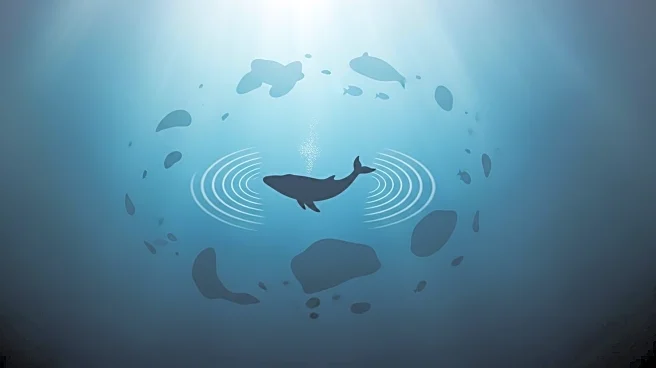What's Happening?
The 52-hertz whale, known for its distinctive call frequency, has intrigued scientists since its discovery in 1989. Unlike typical whale calls, which range from 10 to 39 Hz, this whale's call is pitched at 52 hertz, making it a unique subject of study. Researchers from the Woods Hole Oceanographic Institution have tracked this whale for over three decades, yet its species remains unidentified. Recent speculation suggests the whale may not be as solitary as once thought, following a 2010 discovery of a similar call off the California coast. However, scientific evidence supporting the existence of a companion remains inconclusive. The narrative of the whale's loneliness is challenged by research indicating that other whales might recognize its call, suggesting it may not be entirely isolated.
Why It's Important?
The study of the 52-hertz whale offers insights into marine biology and acoustic communication among whales. Understanding this whale's unique call could reveal new information about whale species and their interactions. The possibility of a hybrid whale, as suggested by recent documentary findings, could expand knowledge on whale genetics and species evolution. Additionally, the whale's story highlights the importance of bioacoustic research in marine conservation efforts, as it may lead to better protection strategies for unique and potentially vulnerable marine species.
What's Next?
Future research may focus on confirming the existence of a companion for the 52-hertz whale and exploring the hybrid theory proposed by recent studies. Continued monitoring and acoustic analysis could provide more definitive answers about the whale's species and social behavior. Scientists may also investigate the broader implications of whale communication patterns and their impact on marine ecosystems. The documentary 'The Loneliest Whale: The Search for 52' may inspire further public interest and funding for research into this enigmatic creature.
Beyond the Headlines
The story of the 52-hertz whale raises questions about the nature of loneliness and communication in the animal kingdom. It challenges assumptions about isolation and highlights the complexity of animal interactions. The whale's tale also underscores the role of storytelling in science, as narratives can drive public engagement and support for research. Ethical considerations in marine research, such as the impact of human activities on whale populations, may also come to the forefront as scientists continue to study this unique phenomenon.











